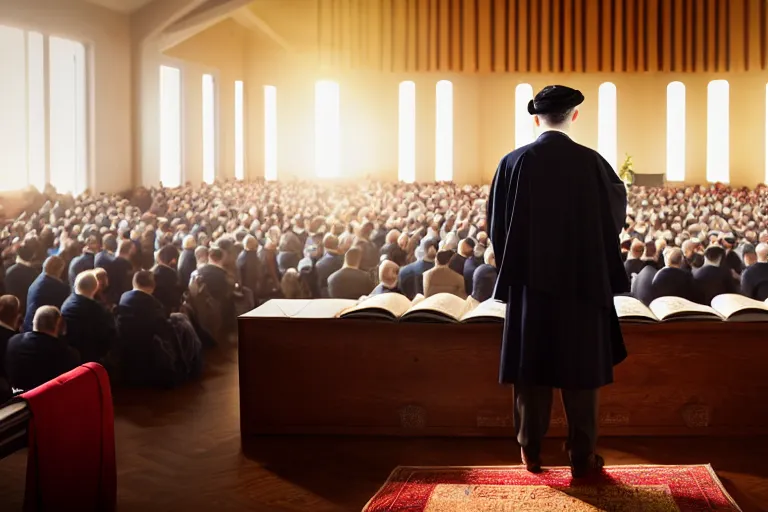Explore the duties, responsibilities, and significance of rabbis within the Jewish faith.
Delve into the role of a rabbi in Judaism, understanding their spiritual, educational, and communal functions. From leading religious services to interpreting sacred texts, learn about the various aspects of a rabbi’s life and work.
The Historical Evolution of the Rabbi
The journey of the rabbi through time has been as intricate and profound as a tapestry woven over millennia. Imagine, if you will, the first rabbis emerging from the shadows of ancient Israel during the Babylonian exile, around 586 BCE. These were not merely teachers but leaders of faith in a world turned upside down. How did these early figures come to embody such pivotal roles?
The transformation from prophets to rabbis was gradual but transformative. The biblical prophets spoke directly to the people, often through visions and direct divine command. Over time, however, as oral traditions became more formalized and the written Torah gained prominence, a new class of teachers arose. These early sages compiled and interpreted the laws, customs, and ethical teachings of Judaism. Were these rabbis simply scholars or did they carry the weight of spiritual guidance?
The development into rabbinic Judaism was marked by the creation of the Mishnah and Talmud around 200 CE, which provided a structured framework for Jewish law and ethics. The rabbis here were not only interpreters but also the guardians of tradition. They debated, refined, and codified what it meant to be a Jew in an ever-changing world.
From the medieval period onward, the role of rabbi continued to evolve, adapting to the challenges of various diasporas. In medieval Europe, rabbis became central figures in communities, providing not only religious guidance but also social and legal support. Can we think of these rabbis as cornerstones, holding their communities together during turbulent times?
In modern times, the role has expanded even further. With advancements in technology and global communication, contemporary rabbis must navigate new challenges while maintaining traditional practices. They serve as educators, counselors, and often activists for social justice issues.
Rabbinic Duties and Responsibilities
When you think about the role of a rabbi, what images come to mind? Are they standing at the helm of a synagogue, guiding the community through prayers and rituals? Or perhaps, delving deep into ancient texts, searching for wisdom that can be applied today? The duties and responsibilities of rabbis are as varied and complex as the Jewish faith itself.
A rabbi is often seen as the bridge between God and people, a role that demands not just religious knowledge but also emotional intelligence. They lead services, ensuring that every word, every chant, and every movement flows seamlessly to create an atmosphere of reverence and awe. Think about it: how many times have you felt the presence of God during a service led by a rabbi? That’s their responsibility—to make the divine accessible in everyday moments.
But leading services is just one aspect. Rabbis are also interpreters of sacred texts, navigating through the layers of meaning within the Torah and Talmud to provide guidance for modern life. Imagine a rabbi trying to explain the commandment about honoring parents in today’s digital age—how do you balance respect with technology? It’s not just about memorizing verses; it’s about making sense of them in our ever-changing world.
Moreover, rabbis are spiritual guides, offering comfort during times of sorrow and joy. They provide counsel on personal issues, from marriage and family to career decisions. How many people have turned to their rabbi for advice? These moments aren’t just about giving answers; they’re about creating a safe space where individuals can explore their thoughts and feelings.
Their role is also crucial in community building. Rabbis organize events, foster relationships among members, and create an environment where everyone feels valued. Consider the bustling synagogue on Shabbat morning—this is the work of a rabbi, weaving together strands of tradition and modernity to keep the community strong.
In essence, rabbis are not just religious leaders but multifaceted figures who shape spiritual lives, interpret ancient wisdom for new contexts, and bind communities together. Their duties and responsibilities are a tapestry woven with threads of leadership, interpretation, and compassion.
The Educational Role of Rabbis
The role of a rabbi in Judaism extends far beyond mere teaching; it’s akin to being a master gardener, nurturing the spiritual roots and intellectual growth of their community. How many of us can claim such multifaceted duties? Rabbis not only impart knowledge but also serve as guides through the intricate labyrinth of Jewish traditions and teachings.
Imagine a rabbi as the captain of a ship sailing through the vast ocean of religious texts, steering its passengers towards enlightenment. Their primary responsibility is to educate and mentor students in Torah, the foundational text of Judaism. This involves not just reading from ancient scrolls but deciphering their meanings and applying them to modern life.
Mentoring students isn’t limited to academic pursuits; it encompasses personal development too. A rabbi acts as a mentor, offering wisdom on ethical living and helping individuals navigate life’s challenges with Chesed, or kindness. It’s like being a coach who not only teaches the game but also builds character in their players.
Furthermore, rabbis guide Jewish learning by fostering a community where curiosity and questioning are encouraged. They create spaces for study sessions, discussions, and debates that keep the flames of knowledge burning brightly. These gatherings aren’t just about reciting verses; they’re opportunities to explore deep philosophical questions and find answers through dialogue.
In essence, the educational role of rabbis is pivotal in sustaining Jewish heritage and ensuring its relevance in contemporary times. They act as custodians of tradition, yet also innovators who adapt ancient wisdom for today’s world. How can we all contribute to this ongoing journey of learning and growth within our communities?
As we delve deeper into the role of rabbis, remember that their impact extends beyond mere instruction—it’s about shaping minds, hearts, and souls. In this endeavor, they embody the very essence of Talmud Torah, or the lifelong pursuit of learning.
Rabbis in Jewish Communities
Rabbis play a pivotal role within Jewish communities, often acting as the heartbeat that connects individuals to their faith and tradition. Imagine a community as a vast garden; rabbis are like the nurturing gardeners who ensure every plant thrives and grows in harmony with its surroundings. How do they achieve this? Through their leadership and interaction with congregations.
Leadership within synagogues is another critical aspect of a rabbi’s role. They guide the community, offering wisdom and direction during times of joy and sorrow. Think of a rabbi as the captain of a ship; they navigate through life’s turbulent waters, ensuring that everyone remains safe and on course towards their spiritual destination. What strategies do rabbis use to keep their communities united and motivated?
Involvement in community affairs extends beyond the walls of synagogues. Rabbis are often seen as trusted advisors and mediators, resolving disputes and fostering peace among neighbors. They act as the glue that binds different sectors of society together, creating a harmonious environment where everyone feels valued and heard. How do rabbis manage to be so integral in community life?
Their influence is felt not just within religious contexts but also in secular realms such as education, healthcare, and social justice. A rabbi’s ability to bridge the gap between tradition and modernity is remarkable; they are like a bridge that connects two shores, allowing ideas and practices from both worlds to coexist peacefully.
By understanding the communal role of rabbis, we can appreciate their multifaceted contributions to Jewish life. They are not just spiritual leaders but also community builders who shape the fabric of Jewish society. How do you see a rabbi’s role in your own community? Do they embody these qualities in ways that resonate with you?
The Significance of Rabbis in Judaism Today
The significance of rabbis in Judaism today cannot be overstated. They serve as guiding lights, illuminating paths through the complex and ever-evolving landscape of modern Jewish life. How do contemporary rabbis shape our understanding of tradition while embracing innovation? Can we truly appreciate their role without recognizing the enduring impact they have on shaping both individual and communal practices?
Consider how rabbis today engage with cutting-edge issues like technology, ethics in business, and environmental stewardship. Are these challenges unique to our era, or do they reflect timeless themes that rabbis have addressed for centuries? The rabbi’s ability to bridge the gap between ancient wisdom and contemporary concerns is nothing short of remarkable.
Furthermore, how do rabbis navigate the cultural landscape of a globalized world where Jewish identity is tested in new ways every day? From interfaith dialogues to social justice initiatives, their role extends beyond religious ceremonies. They are leaders who rally communities around shared values and principles.
Let us also reflect on how rabbis contribute to the intellectual richness of Judaism today. Through sermons, lectures, and writings, they challenge our thinking, urging us to question, explore, and deepen our faith. How do these intellectual contributions shape contemporary Jewish thought? Are we merely following established paths, or are we actively participating in a dynamic tradition that continues to evolve?
In essence, the role of rabbis today is multifaceted, blending tradition with innovation, community leadership with personal guidance. They serve as both guardians and pioneers, ensuring that Judaism remains a vibrant, living faith in our modern world. Can you imagine a Jewish life without their influence? It’s hard to conceive, isn’t it?
The enduring impact of rabbis on Jewish life today is profound, shaping not just religious practices but also cultural norms and ethical standards. Their role as shapers of contemporary Jewish thought ensures that the faith remains relevant, engaging, and meaningful for generations to come.
The Unique Bond Between Rabbis and Their Congregations
Imagine a rabbi as the heart of a tree, deeply rooted and intertwined with its branches and leaves. Just as the tree provides shelter, nourishment, and comfort to those around it, so too do rabbis offer guidance, wisdom, and support to their congregations. This unique bond between rabbis and their communities has evolved over centuries, shaping not only spiritual life but also social and cultural norms.
How did this relationship come into being? In ancient times, the rabbi was often seen as a teacher, a scholar, and sometimes even a judge, all rolled into one. They were the custodians of knowledge and tradition, guiding their people through both religious and secular matters. As time passed, the role became more nuanced, with rabbis not just imparting wisdom but also becoming integral figures in the community’s social fabric.
Consider the rabbi’s role during times of crisis or celebration. During Passover, for example, a rabbi might lead the Seder, guiding families through the intricate rituals and storytelling that connect them to their past. In times of sorrow, they offer comfort, helping individuals navigate grief with dignity and faith. These moments highlight the emotional and spiritual support rabbis provide.
The relationship between rabbis and congregations is not one-sided; it’s a dynamic exchange. While rabbis guide and teach, their communities enrich them through diverse perspectives and experiences. This mutual influence ensures that Judaism remains relevant and vibrant in an ever-changing world. As we look at the present day, we see rabbis playing increasingly multifaceted roles—leading services, providing pastoral care, conducting interfaith dialogues, and more.
How do these evolving roles impact Jewish communities today? They ensure that traditional practices remain alive while also fostering inclusivity and adaptability. By embracing modern challenges and opportunities, rabbis keep Judaism relevant for a wide range of individuals across generations and cultural backgrounds.
Conclusion
 Gain insights into the importance of rabbis in Jewish communities and how they continue to shape Judaism today. Understand the unique bond between rabbis and their congregations and the enduring impact of their teachings.
Gain insights into the importance of rabbis in Jewish communities and how they continue to shape Judaism today. Understand the unique bond between rabbis and their congregations and the enduring impact of their teachings.











